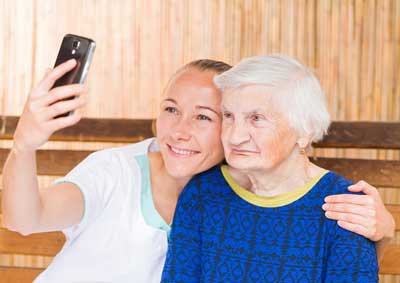Challenges and Complications of Senior Care at Home
[fa icon="calendar'] Dec 1, 2016 8:27:00 AM / by First Choice posted in In-Home Health Care, Caregiver, Questions, Professional Caregiver
Terry Fulmer, RN, PhD, FAAN, president of the John A. Hartford Foundation, observes: "Family caregivers of older adults are almost invisible in our health care system, yet the system could not function without them."
Home Care: There's No Place Like Home!
[fa icon="calendar'] Nov 25, 2016 2:14:00 PM / by First Choice posted in In-Home Health Care, Caregiver, Questions
According to AARP, nearly 90 percent of adults over the age of 65 express a preference for staying in their homes for as long as possible, and 80 percent believe that their current residence is where they will always live. Even if seniors need some assistance with activities of daily living, 82 percent want to stay in their own homes to receive care.
The need for in home care is likely to increase exponentially in the coming years, considering that approximately 10,000 Baby Boomers retire each day. Home care is set to continue a major growth trajectory over the next decade, as more and more seniors choose to age in place at home.
Senior Moments: An Aging Population and Gaps in Senior Care
[fa icon="calendar'] Nov 15, 2016 12:41:00 PM / by First Choice posted in In-Home Health Care, Senior Care, Caregiver, Professional Caregiver
Senior Population Growing Rapidly
Some would argue that there is already a shortage of caregivers to care for the increasing senior population. But statistically speaking, a wider gap is imminent. According to the U.S. Department of Health and Human Services, in 2014, there were 46.2 million people in the U.S. over the age of 65. They represented 14.5 percent of the population.
Now, fast forward to projections for the year 2040. By 2040, adults ages 65 and over will account for 21.7 percent of the population. By 2060, it is estimated that 98 million Americans will be 65 or older. That is more than double the number of seniors in America today.
Sometimes, Caregivers Are Abused
[fa icon="calendar'] Nov 7, 2016 8:18:00 PM / by First Choice posted in In-Home Health Care, Caregiver, Professional Caregiver
Why Seniors May Become Abusive
First, it is important to understand why aggressive or abusive behavior occurs. In some cases, you may be caring for a senior who has always been a little rough around the edges. As he or she gets older and mental and physical health declines, it may be easy for the senior to slip into anger over a perceived loss of independence, control, and ability.
At other times, abusive behavior can spring from a physical or mental condition, such as pain, hallucinations, medication side effects, or dementia. Such conditions may cause a person who has never exhibited violent tendencies to become aggressive.
AARP's "When Caregivers are Abused" notes that abuse can stem from denial on the part of a senior when he or she is confronted with failing health. Aggression can also come from depression on the part of your loved one. Decreased inhibition may also be a factor, especially for those in early stages of frontotemporal dementia and in later stages of Alzheimer's.
How Home Health Care Helps Prevent Avoidable Hospitalizations
[fa icon="calendar'] Oct 24, 2016 6:05:00 PM / by First Choice posted in In-Home Health Care, Caregiver, Professional Caregiver
While recipients of home health care and their families provide much anecdotal evidence of the benefits of home care, it is always good to learn about research in provable positive outcomes of utilizing in-home care services.
A recent Harvard pilot program has been designed to explore whether a new home health care coordination program will reduce the number of repeat hospitalizations among seniors using the services of home health agencies.
Brain Power & Seniors: 4 Ways Home Health Care Can Help
[fa icon="calendar'] Oct 18, 2016 7:25:00 AM / by First Choice posted in In-Home Health Care, Caregiver, Keeping Active
According to the CDC, one in five seniors is dealing with a mental health issue of some sort. Baby Boomers, now entering their retirement years, list mental decline as a significant source of concern as they age.
However, studies indicate that there are ways to bolster brain power in seniors and help stave off mental decline in the process. This means that seniors do not necessarily have to experience major mental decline as they age. Lifestyle factors can greatly reduce the rate or incidence of mental decline.
If your loved one is worried about declining mental health, home health care can do much to help create an environment in which your senior can flourish both mentally and physically. Consider these ways home health care can bolster mental health in seniors:
How to Avoid Burnout When Providing Home Care Services
[fa icon="calendar'] Oct 3, 2016 3:52:00 PM / by First Choice posted in In-Home Health Care, Caregiver, Professional Caregiver
Understanding What Caregiver Burnout Is
The first step to preventing caregiver burnout is to understand what it is. According to WebMD, caregiver burnout is "a state of physical, emotional, and mental exhaustion that may be accompanied by a change in attitude -- from positive and caring to negative and unconcerned."
Home Health Care: Preferred Career Path for Many
[fa icon="calendar'] Sep 18, 2016 4:00:00 PM / by First Choice posted in In-Home Health Care, Caregiver, Career
Home Health Care Fills a Growing Need
As the U.S. population continues to age, home health care will be needed more than ever, making it an excellent career choice for many nurses, CNAs, and other home care providers.
But even now, home health care addresses a significant need for many. USA Today's "Home Care for Seniors: a Win-Win" outlines several clinical advantages that come from seeing patients in their home environment.
Expert Interview Series: Ron Tester of Advanced RehabTrust Home Health On How To Choose The Right In-Home Care Provider
[fa icon="calendar'] Sep 3, 2016 10:00:00 AM / by First Choice posted in In-Home Health Care, Caregiver, Expert Interview
Ron Tester, PT, COS-C, is the founder and Administrator of Advanced RehabTrust Home Health, a nationally-recognized home health agency serving North Texas.
According to the AARP, nearly 90% of seniors want to stay at home as they get older. What are some reasons more seniors are choosing to "age in place", as the AARP put it?
There are several reasons seniors want to stay home. Most important, they can keep their independence. Even if they have some help at home, they still get to eat what they want, when they want; get up and go to bed when they want; and do whatever they want without having to worry about an institution telling them what to eat, what to do or when to do it.
Also, most seniors want to be in familiar surroundings. No facility is ever going to feel like "home" the way home does. Even if they can squeeze their bed, couch and china cabinet into the new place, it's just not the same.
Third, leaving home for a senior living facility - even a nice one - often feels like "the beginning of the end." Many seniors who move away from home feel like they are resigning themselves to fate or "giving up."
Aging Population and the Increased Need for In-Home Care
[fa icon="calendar'] Aug 24, 2016 4:00:00 PM / by First Choice posted in In-Home Health Care, Caregiver
What will this mean for in-home care? The report notes: "The number of older single persons living alone will climb, implying a significant increase in the need for in-home healthcare and supportive services."










